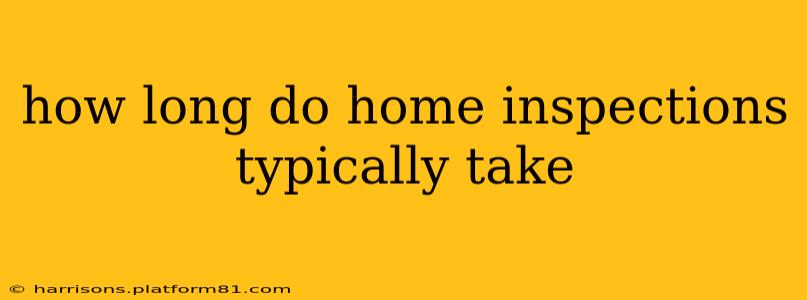Buying a home is a significant investment, and a thorough home inspection is a crucial step in the process. But how long should you expect this vital process to take? The answer isn't a simple number, as several factors influence the inspection's duration. This comprehensive guide will explore the typical timeframe, influencing factors, and what to expect during your home inspection.
What is a Typical Home Inspection Timeframe?
A standard home inspection usually takes between two and four hours. This timeframe applies to a typical single-family home of average size and complexity. However, it's important to remember that this is just an estimate.
Factors Affecting Home Inspection Duration
Several factors can significantly influence the time a home inspector needs to complete their assessment:
-
Size of the Home: Larger homes with more rooms, square footage, and outbuildings naturally require more time to inspect thoroughly. A sprawling mansion will take considerably longer than a small condo.
-
Age and Condition of the Home: Older homes often require a more in-depth inspection due to potential issues associated with age and deferred maintenance. Homes in disrepair or showing signs of significant damage may also extend the inspection time.
-
Complexity of the Systems: The intricacy of the home's systems, such as plumbing, electrical, and HVAC, plays a significant role. Homes with older or unusual systems might necessitate more time for a comprehensive evaluation.
-
Accessibility: Difficult-to-access areas, like crawl spaces with limited headroom or attics filled with clutter, can significantly increase the inspection time.
-
Inspector's Thoroughness: Experienced and meticulous inspectors prioritize a thorough examination, even if it means exceeding the average inspection time. They understand that a detailed assessment can save homeowners significant costs and headaches down the line.
-
Weather Conditions: Adverse weather, such as heavy rain or snow, may temporarily halt certain aspects of the inspection or make access to certain areas more challenging, thus adding time.
How Long Does an Inspection Take for Different Property Types?
The size and complexity of the property significantly impact the duration. For example:
- Condos/Townhouses: These generally take less time, often completing within 1-3 hours.
- Single-Family Homes: As mentioned, these usually take 2-4 hours.
- Larger Homes/Multi-Unit Properties: These can take 4+ hours, sometimes even exceeding a full day, depending on the factors mentioned above.
What Happens During a Home Inspection?
During the inspection, a qualified inspector will systematically examine various aspects of the property, including:
- Exterior: Roof, siding, gutters, foundation, landscaping, and surrounding structures.
- Interior: Walls, floors, ceilings, windows, doors, and built-in appliances.
- Plumbing: Pipes, fixtures, water heater, and drainage systems.
- Electrical: Wiring, outlets, panels, and lighting fixtures.
- HVAC: Heating and cooling systems, including furnaces, air conditioners, and ventilation.
The inspector will meticulously document any issues or defects found, providing a detailed written report afterward.
When Do I Receive the Home Inspection Report?
Typically, you'll receive the home inspection report within 24-48 hours after the inspection is completed. Some inspectors may take a little longer, especially if the property was exceptionally large or complex.
Can I be Present During the Home Inspection?
Yes, you are typically welcome to be present during the home inspection. This allows you to observe the process and ask questions directly to the inspector. However, remember to give the inspector space to perform their work effectively.
In conclusion, while a typical home inspection takes between two and four hours, various factors can influence this timeframe. Understanding these variables will help you better manage your expectations and plan accordingly. Remember to discuss the anticipated duration with your chosen home inspector beforehand.
